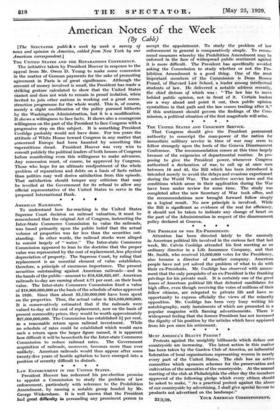American Notes of the Week
(By Cable)
[The SPECTATOR publids-s week by week a survey of news and opinion in America, cabled from New York by our American correspondent.]
THE UNITED STATES AND THE REPARATIONS CONFERENCE.
The initiative taken by President Hoover in response to the appeal from Mr. Owen D. Young to make some concession in the matter of- German -payments for the sake of promoting agreement in Paris is of -great significance. Although the amount of money involved is small, the President has made a striking gesture calculated to show that the United States *mot and does not wish to remain in proud isolation, when invited to join other nations in working out a great recon- struction programme for the whole world. This is, of course, merely a slight modification of the policy pursued hitherto by the Washington Administration, but it is a modification. It shows a willingness to face facts. It shows also a courageous willingness on the part of the President to face Congress with a progressive step on this subject. It is something President Coolidge probably would not have done. For ten years the attitude of White House toward Congress in any matter that concerned Europe had been haunted by something like superstitious dread. President Hoover was very wise to consult publicly the political leaders of both houses of Congress before manifesting even this willingness to make advances. Any concession must, of course, be approved by Congress. Those who hope for an ultimate readjustment of the whole problem of reparations and debts on a basis of facts rather than politics may well derive satisfaction from this episode. That satisfaction should temper any criticism that may be levelled at the Government for its refusal to allow any official representative of the United States to serve in the proposed International Bank.








































 Previous page
Previous page